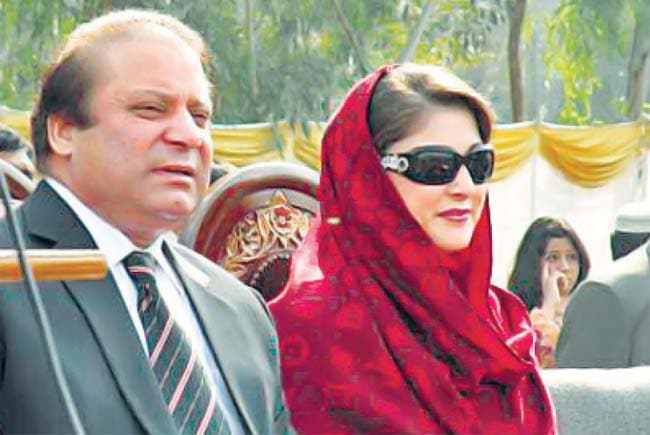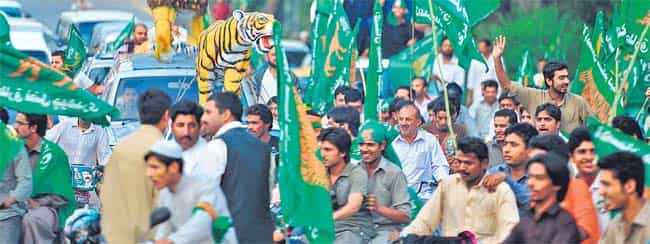'I admire Sonia Gandhi for making a mark in India'
The Sharifs have returned to the stately official residence after a long gap of 14 years and memories of the 1999 coup return with a gush. Maryam Sharif, the young heir to the Sharif clan, shares her views on Pakistan, democracy, dictatorship and dynasty with Harinder Baweja.
Within a few hours of being sworn in as the Prime Minister of Pakistan, Nawaz Sharif and his wife, Kalsoom host their first dinner for a select few. The Sharifs have returned to the stately official residence after a long gap of 14 years and memories of the 1999 coup return with a gush.

It was in this house that Sharif was put under house arrest by General Pervez Musharraf's army before being taken to a barrack without windows. I'm seated at the first lady's table and she talks incessantly about how the army placed a tank outside her bedroom window; how she disguised herself as a maid and managed to once give the army a skip so she could call her son in London. She talks about her struggle - when she went from prison to prison and court room after court room to defend the charges against her husband.
"It's been so long, but today everything is coming back," she says. The experience is surreal and waiters hover around the first lady, serving a host of Pakistani dishes. Ask her about what fate she wants the under house arrest Musharraf to meet and she's diplomatic in her reply - some things should always be left to Allah, she replies, adding, "he is the ultimate arbiter."
Her daughter, Maryam Sharif, now a household name in Pakistan and one who is seen as the rising star on the country's political firmament, is also seated on the same table. The 38-year-old, second of four children - two sons and two daughters - is upbeat and also talks incessantly, but about strengthening democracy. "Let's not talk about the coup," she says but goes on to answer a flurry of questions in her first interview to an Indian publication.

What drew you to politics?
I can't give you one instance, one moment when I felt attracted to politics. Politics was in me somewhere being a progeny of a political household. I have been eating and breathing politics and I have stood by my father through his most testing times. Today, we are back in the prime minister's house but I've been through courts and prisons and stayed close to abba all through the years of exile. I think it's just natural to follow in the footsteps of your parents.
Why you? Why not your brothers?
Politics requires passion and commitment. It tests your nerves and your patience all the time. My brothers live abroad - in Jeddah and London and are busy with their businesses. I think, in the end it all boils down to the fact that they are very private people. Politics demands that you be available 24/7. Politics is not a kindergarten. You can't play with the lives of 180 million people.
Tell us about your years in exile
It was a very tough phase in our lives. Before we were allowed to travel to Saudi Arabia, my mother and I were put under house arrest and left to fight the false charges. That period perhaps served as my induction into politics. My children were very young, my son only three years old and my daughter two but on hindsight I think we got time together as a family. Abbu and the rest of us used the time supporting each other as a family. I grew up in those eight years in exile and I think we emerged as better people, not embittered and vindictive but positive. I sought refuge in holy places but always yearned to return to Pakistan which is my home.
Are you bitter about General Musharraf?
You know, my grandfather died while he was with us in Saudi Arabia and my father, Nawaz Sharif regrets the fact that as the first born, he was not allowed to return to Pakistan with his father's body for the last rites. I wonder if Musharraf, who is currently under house arrest, has learnt his lessons. Pakistan has been under the shadow of dictatorship for too long. The election results, I hope, have come as a lesson to all those who think of adventurism. I have seen my father struggle for democracy. A 50 to 60% turnout in a terror-stricken country where there is so much fear is a glorious achievement. The world that eyed Pakistan with suspicion now deserves to give Pakistan a pat. I'm a proud Pakistani today.

Tell me, who is your role model? Would it be Benazir Bhutto in the context of Pakistan?
I met Benazir Bhutto only once when she came to Riyadh to discuss the charter of democracy with my father. I remember her humility and have imbibed that. I believe in individualism but if I must name a role model, it would be my mother who struggled for democracy after the coup and fearlessly challenged a dictator. I admire Sonia Gandhi for her integrity and for making a mark in India. I also admire Hillary Clinton for growing out of the influence of her husband.
It is interesting to hear you say this because you are also a product of dynastic politics, as is practiced in our part of the region, isn't it?
I'm not apologetic about being a Sharif. I'm proud of being linked to Nawaz Sharif and I think it is a beautiful legacy. I think dynastic politics is the will of the people.
What comes to your mind when you think India?
I think zero conflict, I think trade, I think good relations and I think peace. War is an outdated word which many saner elements have disregarded. We intend to pick up the threads with India and I have elicited a promise out of my father that whenever he goes to India, he will take me along. I look forward to visiting India.
Why didn't you contest the elections considering you see yourself as a full time politician now?
I wanted to help the party and run my father's campaign and not be restricted to one constituency. I have no air of superiority because I'm Nawaz Sharif's daughter. I seek his permission and blessing for everything that I do and I can tell you that he is a very orthodox, conventional and very eastern father. He remains concerned about my security and doesn't let me stay out late. I'm very happy that he left his constituency in Lahore to me and did not visit even once.
Imran Khan ran a very successful campaign with the support of the youth. Was it a challenge?
(Smiles) The results speak for themselves. There is a difference between the cricket field and the political arena. It is good for democracy that we have another party and are no longer a largely two party polity.
Lastly, what is in store for you politically? Will you be joining the government? And, what is it that your father does not let you do?
I have learnt not to make predictions. I will work in the prime minister's office without a title or designation. Nawaz Sharif will take decisions and I'll work overtime to try and implement them.





